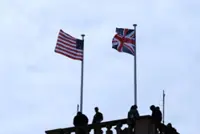Delegates attend the 13th WTO ministerial conference in Abu Dhabi, United Arab Emirates, February 26, 2024. REUTERS/Abdel Hadi Ramahi
WASHINGTON (Reuters) - The World Trade Organization's moratorium on customs duties on digital transmissions, a key pillar of internet development for decades, won a last-minute reprieve on Friday, but the deal will force companies to confront its expiration again in 2026.
The WTO's 13th ministerial meeting in its final hour produced a deal in Abu Dhabi to extend the moratorium until the until the next ministerial meeting in two years, but with a hard expiration that will require a more extensive negotiation at that time.





